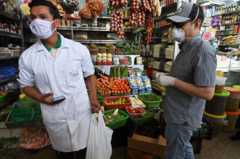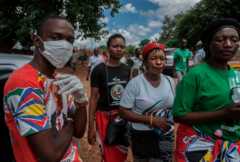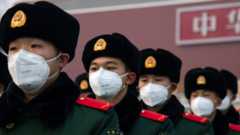Live Reporting
Get involved
- Send an email to haveyoursay@bbc.co.uk
- Google is to publicly track people's movements over the course of the coronavirus pandemic, so that the information can be used by public health officials and others to help manage the outbreak.The tech firm will publish details of the different types of places people are going to on a county-by-county basis in the UK, as well as similar data for 130 other countries.The plan is to issue a daily update with the figures referring back to activity from two or three days prior.The company has promised that individuals' privacy will be preserved.The readings are based on location data gathered via the Google Maps app or one of the firm's other mobile services.They will be broken down to reveal how busy some places have been, compared to a period earlier in the year before lockdowns were introduced.
- Peru is to stop people from leaving their homes according to their gender, in a bid to slow the spread of the coronavirus.Men will be allowed to go out on Mondays, Wednesdays and Fridays but only to buy essential items, President Martín Vizcarra announced in a national address.Women will be free to leave their homes on the other days of the week, with the exception of Sundays, when no one will be allowed out.The measures will be in place until at least 12 April. Panama announced similar gender-based restrictions last week.Peru was one of the first countries in South America to introduce lockdown measures.It has reported more than 1,400 cases of Covid-19 so far, according to figures compiled by Johns Hopkins University in the US.
- Outrage over a Muslim congregation - called Tablighi Jamaat - that has sparked a new wave of Covid-19 cases in India has taken a communal turn.Islamophobic hashtags have been trending since news first broke on Monday.More more than 300 positive cases across India have been traced to the weeks-long event, which was held in the capital, Delhi, earlier this month.Hundreds of people also stayed on at the event venue because of a 21-day lockdown.Officials say they didn't follow social distancing, causing the virus to spread.The fallout from the event - cases directly linked to it continue to rise - has exposed religious fault lines in a sharply polarised India.Tweets and memes derogatory to Muslims, and even blaming the community, have been doing the rounds on social media."Instead of corona quarantine, we should have hate quarantine," historian Rana Safvi told us at the BBC.India has reported 2,088 cases so far and 56 deaths - officials said there has been a clear spike as a result of the congregation in Delhi.
- Infections have been rising swiftly in Germany and now the Robert Koch public health institute says the death toll has reached 1,017, up 145 in the past 24 hours.The confirmed number of cases is up 6,714 to 79,696, says the RKI. Meanwhile, Johns Hopkins University in the US says German infections are closer to 85,000, which would put Germany higher than the officially declared positive cases in China. Bavaria in the south has the highest number of cases, with 146.5 for every 100,000 residents, according to news agency DPA.
- An empty race track, a swimming pool with not even a ripple and a hauntingly quiet gym devoid of athletes.These pictures out of a sports centre in the New Zealand city of Auckland show the effect of the virus on everyday life.The country is currently in a state of lockdown - mass gatherings have been banned and its borders closed to all foreigners.There are currently 868 confirmed virus cases in New Zealand.
- India's biggest Bollywood star, Shah Rukh Khan, has announced a series of measures to support efforts against Covid-19."Given the enormity of the task, my team and I discussed ways to contribute in our own modest way. We have come up with a series of initiatives, which we hope will make a small difference," he said in a statement on Twitter.Khan will work with state governments in Maharashtra and West Bengal to help supply 50,000 items of PPE equipment for health workers.He will also provide daily food requirements to more than 5,500 families in the city of Mumbai, where he lives, as well as set up a kitchen that will make 2,000 meals every day to serve homes and hospitals whose needs aren't being met.The mega-star has appeared in more than 90 films and is considered one of India's most recognisable and popular celebrities.
- The coronavirus crisis will transform the way we live, work and travel, the president of the UK Automobile Association (AA) has said.Edmund King has predicted a permanent reduction in travel because many people have learned to work from home.The government currently plans to spend £100bn on the HS2 high-speed rail link and £27bn on roads to provide extra capacity but this will be challenged if travel reduces.Mr King told BBC News: “Arguably in future we should invest more in broadband, because what this crisis has shown is the majority of companies can continue working from home. It can be more efficient and save money.”Some say it’s too soon to predict a permanent increase in home working.Others say road and rail spending should be frozen for a decade to review – and the cash diverted to insulating homes instead.
- On average, about 1,600 people a day die in the UK.What is not known about the coronavirus deaths being reported is to what extent those deaths are on top of that figure - or a part of it.Many of the victims are old and frail people with underlying health conditions who are therefore are at the highest risk of dying.And experts predict there will be significant overlap between the coronavirus deaths and those who would normally be expected to die.So what are death figures really telling us? And how bad is it going to get?
- If you're just joining us in the UK, good morning and welcome. Here are the latest headlines:
- The government is under growing pressure to explain how it will meet its target of increasing coronavirus testing ten-fold by the end of April. Health Secretary Matt Hancock has said he wants 100,000 tests to be carried out every day
- But the Labour party said there were no details on how this could be achieved or what sort of testing would be involved
- Meanwhile, a new hospital that will treat intensive care Covid-19 patients is set to open in east London later today. The temporary facility - known as the NHS Nightingale Hospital - has a capacity for up to 4,000 patients
- It comes as the government said it would write off £13.4bn ($16.6bn) of historic NHS debt, so that hospital trusts are in a "stronger position" to deal with the outbreak
- Heathrow Airport has said it will close one of its runways next week as air traffic continues to fall globally
- The number of people with the virus who have died in the UK rose by 569, according to figures released on Thursday. It brings the total to 2,921
- And 163,194 people have so far been tested for the virus, of which 33,718 were confirmed positive
- Malawi has reported its first three confirmed cases of coronavirus.The southern African nation was among the few African countries yet to report cases. Others include Lesotho, Comoros, South Sudan and São Tomé and Príncipe.The news means there are just 18 countries left without a confirmed case. Find out where they are here.
- President Joko Widodo has made a plea for Indonesians to cancel their annual mass exodus, typically occurring at the end of the Muslim fasting month, Ramadan (which this year ends 23 May).He has also proposed to push back the national holiday, "to bring calm to the public".Tens of millions of people in Indonesia, the world’s most populous Muslim-majority nation, each year flock to their hometown to celebrate Eid.But this year the routine is deemed risky amid the coronavirus pandemic.The government said it decided not to ban the mass exodus as it was unlikely that people would obey it.They might be right. Despite declaring a public health emergency, urging public distancing and working from home, some roads in Jakarta are still very busy.Not all people can afford to work from home, particularly informal workers who rely on daily income to live. The government is reluctant to implement a full lockdown, and people can still move in and out of the capital.As of Thursday, Indonesia has 1,790 positive cases and 170 deaths, the highest death toll in Asia outside of China.
Video content
Australians are having fun with fancy dress videos - bringing some relief to the stresses of lockdown.- Washing your hands is still one of the most effective ways to prevent yourself catching the virus. In case you need a refresher on how to do it right, here’s our 20-second explainer on the correct technique.
Video content
- China will hold three minutes of silence across the country on Saturday to mourn the "martyrs" of the fight against the virus pandemic.It's scheduled to happen at 10:00 local time (02:00 GMT) and the silence will be followed by air raid sirens and car horns "wailing in grief", state news agency Xinhua says.The coronavirus emerged in China and numbers peaked in January and February, with the current total death toll above 3,300. Among the dead have been many health care workers and doctors.In recent weeks, local transmission and new fatalities have been very low. Authorities say they are more worried about travellers importing the virus from abroad than local transmissions.
- Nigerian President Muhammadu Buhari’s daughter has completed a two-week self-isolation and reunited with the first family.First Lady Aisha Buhari’s spokesperson Aliyu Abdullahi, in a statement, said the president’s daughter was “normal, healthy and well”.The president’s daughter returned from the UK last month and went into isolation in compliance with the country’s directive.The first lady shared a photo of her reunion with her daughter:
- American Jazz guitarist John "Bucky" Pizzarelli has died at his home in Saddle River, New Jersey, aged 94.His family members told the New York Times they believed the cause of death on Wednesday was coronavirus.Pizzarelli had an illustrious career spanning eight decades. He was inducted into the New Jersey Hall of Fame.Two other high-profile American musicians also died this week from complications linked to coronavirus: jazz pianist Ellis Marsalis Jr, 85, and 52-year-old Adam Schlesinger, from the power pop band Fountains of Wayne.
- Raiwind in Pakistan is under total lockdown with a ban on all commercial activities and transport after some 40 preachers tested positive.They belong to the Islamic missionary movement Tablighi Jamaat, whose members have also been in the news in India and Malaysia as prime suspects among potential coronavirus carriers.Here's more news from the rest of South Asia:
- After Sri Lanka saw its biggest jump in daily infections (21), there have been calls for more testing. The World Bank has just approved $128.6 in emergency funding to the country, which has 146 cases so far
- Bangladesh to convert all its stadiums to quarantine facilities or field hospitals. The country has one of the lowest testing rates worldwide
- A sixth person has tested positive in Nepal, which earlier this week extended its lockdown to 7 April
- Before Covid-19, I was fretting about how I'd arrange to see my mother in Egypt and my sister in Canada. But now, like people everywhere, we know the only way to be together is virtually.My sister and I enjoyed a YouTube-watching marathon on one video call; we’re planning a movie night this weekend.Video chats with my mother are more challenging – they mostly involve me asking her to centre the camera so I can see more than her ear.Many of us are rethinking how we stay connected with family overseas as travel becomes less possible. If you’re looking for ideas, here's one article with a few suggestions.
- The Perth Mint, Australia’s largest, has reported a big rise in demand for gold and silver amid the coronavirus pandemic.Precious metals like gold and silver are considered "safe haven" assets in times of financial crises. They are perceived to hold their value during stock market volatility.For March, sales of gold coins and bars at the Perth Mint hit their highest level since April 2013, according to Bloomberg data. Silver sales almost tripled compared to February’s figures.The mint’s gold kilobars were sold out last week due to the surge in demand - so it has reopened its manufacturing facility.
- Japan's biggest music festival - and one of the biggest in Asia - is still determined to go ahead. Fuji Rock is scheduled to kick off on 21 August this summer.Travellers from pretty much everywhere in the world are banned from entering Japan - but organisers are clearly optimistic things will improve in four months' time.Other festivals around the globe have already fallen victim to the pandemic.Britain's Glastonbury, which was scheduled for June, has been called off but Lollapalooza in the US, scheduled for early August, is also still on track.

















No comments:
Post a Comment